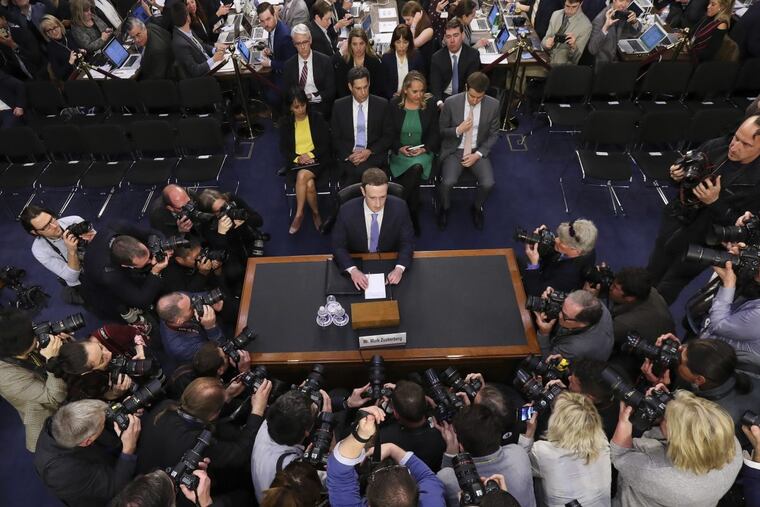Facebook's (and tech's) other problem: lack of diversity | Opinion
Black and brown social media use is as high, if not higher, than white usage. In fact, according to Pew, the black social media audience uses Facebook more than the white audience

The most significant takeaway from two consecutive days of congressional hearings on Facebook wasn't really privacy, or the hacking of elections, or where to go next on regulating social media.
It was the question about an egregious lack of diversity in the technology sector.
When Congressional Black Caucus members raised it pointedly with Facebook CEO Mark Zuckerberg on Day Two of the House hearings, you could tell neither he nor the hearing audience was prepared. Instead, that line of questioning received the same dismissive reception that most conversations on innovation-industry diversity have received.
And therein lies the problem that's not about Facebook and its gross mishandling of repeated data breaching and 2016 election cycle manipulation. It's the fundamental problem with the overall, very white, male-reigned space of what's affectionately (or cursedly) called "tech."
"You've increased your black representation from 2 to 3 percent," pressed Rep. G.K. Butterfield (D., N.C.) during Wednesday's House Commerce Committee hearing, adding that it was "a small increase" while Facebook still showcased an all-white C-suite. "Not only you and Sheryl, but David, Mike, and Chris. This does not represent America."
Butterfield's CBC colleague, Rep. Yvette Clarke (D., N.Y.), was also unnerved. "I'm concerned that there are not eyes that are culturally competent looking at these things," observed Clarke, who posited out loud how Russian hackers used Facebook as a primary assault vehicle to exploit deeply polarizing racial discourse infecting the political landscape.
From fake Black Lives Matter pages scamming users into fund-raising to bad-actor-backed ads stoking up racial stereotypes, Facebook could have saved itself much hassle had it simply expanded the complexion and perspective of its workforce.
Individuals unaccustomed to the daily stings and rigor of systemic racial or cultural assault would view this conversation as trivial. Yet, recent concerns were nothing new. Congressional Black Caucus members have long warned tech about its unwillingness to diversify. During November hearings on Russian digital dark ops, Rep. Terri Sewell (D., Ala.) engaged Facebook general counsel Colin Stretch on the exact same issue. ("Who are your vetters and are they a diverse group of people?")
Black lawmakers – against the implicit bias of a society that doubts them — raise crucial questions determining the very fate of Facebook, the industry it's in, and the world that craves for it. Industry titans and decision-makers like Zuckerberg must quit viewing users of color as nothing more than users of their products.
Black and brown social media use is as high, if not higher, than white usage. In fact, according to Pew, the black social media audience uses Facebook more than the white audience. Hence, Facebook's very existence relies on black consumption. Common business sense dictates the need for company leadership to proportionally reflect a loyal consumer base.
That doesn't mean simply installing one retired African American Fortune 500 executive on its board. Nor should we allow the country-clubbish tech sector to deflect criticism with counter-arguments that there isn't enough "skilled" black talent to access. As the Kapor Center for Social Impact notes in its interactive report, The Leaky Tech Pipeline, African Americans represent nearly 9 percent of computing and mathematical occupations (while nearly 12 percent of the overall U.S. labor force). Black and Latino undergraduates, in fact, are 20 percent of all computer science bachelor's degree candidates and more than 20 percent of master's degree candidates in the same field. So why are they just 1 percent and 2 percent of engineering leadership at Twitter and Google, respectively?
The industry's mindset is dominated by a one-dimensional perspective in which everyone making decisions within it has the same skin color, arrives from similar backgrounds, and will, ultimately, arrive at similar conclusions. It's like expecting the Doctor's destructive, single-minded, all-the-same nemeses the Daleks on Doctor Who to suddenly take up gardening (when we know that's not happening).
In the premier San Francisco Bay Area technology sector alone, black male and female professionals are a downright unjust 78 percent and 58 percent "below parity," respectively. That's after several years of heightened awareness, symbolic check-cutting, and fronted coding programs that claim to open "pipelines," along with numerous initiatives we can't keep track of.
And yet we wonder why the technology sector presently implodes, both optically and patently as innovation slows down. Northwestern University's Robert Gordon calls growth over the last 50 years "simultaneously dazzling and disappointing." Rising inequality and the innovation industry's refusal to accept parity would have a great deal to do with that.
Yet, diversity, as experts argue, leads to not only growth but the enhancement of an industry's ability to innovate, manage, and prosper. Organizations can't grow with everyone preaching to the same racial or socio-economic choir – they really can't, given the fact that demographic trends already show a society in which people of color will soon be the majority. That seems like a no-brainer.
Silicon Valley, apparently, isn't really that smart after all.
Charles D. Ellison is host of "Reality Check," a daily public affairs program on WURD radio (96.1FM/900AM in Philadelphia). He is also principal of Washington-based B|E Strategy, the Washington correspondent of the Philadelphia Tribune, and a contributor to Philadelphia Citizen. @ellisonreport.